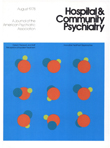Therapists', Patients', and Inpatient Staff's Views of Treatment Modes and Outcomes
Abstract
Data were gathered on 199 consecutive admissions to a community mental health center in an exploratory study to compare patients', therapists', and inpatient staff's perceptions of inpatient treatment. The three groups showed little agreement on the identification of patients' symptoms or on assessments of change for those cases in which they agreed on the symptoms. There was also little concurrence between the inpatient staff and therapists in reporting which major therapeutic modalities they used, and in identifying cases in which there were communication problems between therapist and staff. However, neither the use of different treatment approaches nor the existence of communication problems was related to longer lengths of stay or poorer outcomes. The authors note that many of the findings are consistent with comparisons elsewhere of patients' and caregivers' perceptions of outpatient psychotherapy and general medical care.
Access content
To read the fulltext, please use one of the options below to sign in or purchase access.- Personal login
- Institutional Login
- Sign in via OpenAthens
- Register for access
-
Please login/register if you wish to pair your device and check access availability.
Not a subscriber?
PsychiatryOnline subscription options offer access to the DSM-5 library, books, journals, CME, and patient resources. This all-in-one virtual library provides psychiatrists and mental health professionals with key resources for diagnosis, treatment, research, and professional development.
Need more help? PsychiatryOnline Customer Service may be reached by emailing [email protected] or by calling 800-368-5777 (in the U.S.) or 703-907-7322 (outside the U.S.).



